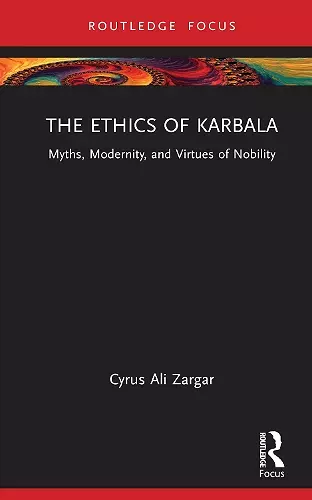The Ethics of Karbala
Myths, Modernity, and Virtues of Nobility
Format:Hardback
Publisher:Taylor & Francis Ltd
Published:11th Jul '24
Currently unavailable, and unfortunately no date known when it will be back

The Ethics of Karbala investigates the relationship between sacred narratives and the development of character. Focusing on the warrior ethos expressed in accounts of the Battle of Karbala, Zargar searches for the place of the martial virtues in modern life and warfare.
This book is the first of its kind in taking a virtue ethics approach to the study of Islamic history. It offers an ethical analysis of arguably the most pivotal moment in Islamic history. To do so, it makes use of interdisciplinary methods, especially global philosophy and religious studies, and draws on philosophical concepts spanning from Nietzsche to Iqbal. The book’s clear and engaging prose makes it accessible to readers seeking a profound understanding of intersections between practical philosophy and religious myths.
This book targets upper-level undergraduate readers seeking to discover Islamic ethics. It will serve nonspecialists, specialists in Shiʿi Islamic studies, and all those interested in Islamic ethics, virtue ethics, cross-cultural philosophy, Nietzsche studies, military science, and religious studies.
"From the last two decades of the seventh century to today, countless Muslims have mourned the murder of al-Husayn (the noble grandson of the Prophet Muhammad). Their work of mourning, however, refuses the intrigue of political pessimism and cynical reason. Rather, they reflect on their responsibility to uphold justice by coming together to remember and feel something of the Karbala tragedy. Does the living memory of this tragedy have ethical relevance today? Scholar of Islamic philosophy and religious ethics Cyrus Ali Zargar answers a resounding 'yes.' He argues that myths about heroic conduct can help us to grapple with the ethical apathy that has beset contemporary regimes—both our current natures of states and states of nature. Thus, to remember al-Husayn in these troubling times is to renew our collective commitment to courage and sincerity, care, and sacrifice. A must-read for anyone interested in moral exemplars, virtue ethics, and the resources of mourning and melancholia."
Ali Altaf Mian, Izzat Hasan Sheikh Fellow in Islamic Studies, University of Florida, USA
"Zargar’s pen draws ink from a well that is not of this world. His elegant prose rivals the best of the lyric tradition that grew around the remembrance of Karbala, and the masterful translations interspersed throughout transport the reader to the ritual contexts of these stories. While the book foregrounds the ethical dimension of the Karbala narrative, Zargar has not left its historical, affective, or even mystical dimensions unexamined. In Zargar’s hands, the warrior ethos at the heart of the myth of Karbala becomes a poignant critique of modern warfare, late-stage capitalism, and the postmodern human condition. Simply put, the book is peerless."
Aun Hasan Ali, Assistant Professor of Islamic Studies, University of Colorado Boulder, USA
"Cyrus Ali Zargar’s The Ethics of Karbala is a brilliant study of one of the defining moments in all of Islamic history, namely the tragic murder of the grandson of the Prophet in Karbala. A work of astonishing erudition, The Ethics of Karbala weaves together elements as disparate as Islamic mytho-poetics, Shi'a spirituality, Islamic ethics, Nietzsche, Marvel heroes, and contemporary war ethics into a coherent narrative. It is sure to become a pioneering model for studying nonmodern ethics in light of modern issues."
Muhammad U. Faruque, author of Sculpting the Self: Islam, Selfhood, and Human Flourishing
"The Ethics of Karbala is a brilliant gem of a book. It is elegant and exceptionally well-written. Cyrus Zargar's examination of nobility, virtue, and the warrior ethic in Shi'ism constitutes an engaging study of positive forms of masculinity, a sorely needed topic within the academic study of Shi'ism specifically but also within the study of Islam more generally. "
Edith Szanto, University of Alabama, USA
ISBN: 9781032198002
Dimensions: unknown
Weight: 226g
100 pages